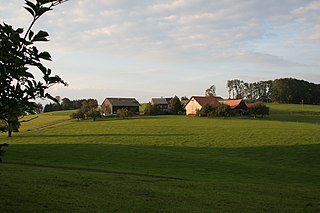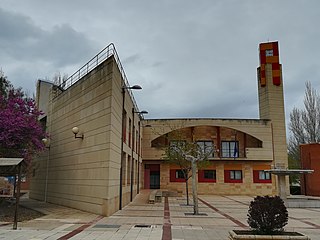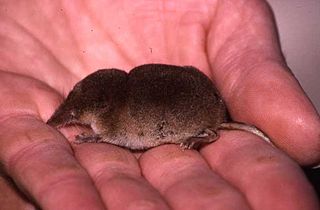Related Research Articles
H, or h, is the eighth letter in the Latin alphabet, used in the modern English alphabet, the alphabets of other western European languages and others worldwide. Its name in English is aitch, or regionally haitch.

Spanish, or Castilian, is a Romance language of the Indo-European language family that evolved from colloquial Latin spoken on the Iberian Peninsula of Europe. Today, it is a global language with about 486 million native speakers, mainly in the Americas and Spain. Spanish is the official language of 20 countries. It is the world's second-most spoken native language after Mandarin Chinese; the world's fourth-most spoken language overall after English, Mandarin Chinese, and Hindustani (Hindi-Urdu); and the world's most widely spoken Romance language. The country with the largest population of native Spanish speakers is Mexico.

A hamlet is a human settlement that is smaller than a town or village. Its size relative to a parish can depend on the administration and region. A hamlet may be considered to be a smaller settlement or subdivision or satellite entity to a larger settlement.

Figueruelas is a small town and municipality in the Spanish Autonomous Region of Aragón, province of Zaragoza.
Bufali is a village and municipality about 3 km from Albaida and 78 km from the city of Valencia, Spain. It is situated in the Vall d'Albaida.
Moses Cohen Henriques was a Dutch pirate of Portuguese Sephardic Jewish origin, operating in the Caribbean.

Mozota is a small town and municipality in Zaragoza province 25 km southwest of Zaragoza, Aragon, Spain.
The Battle of María saw a small Spanish army led by Joaquín Blake y Joyes face an Imperial French corps under Louis Gabriel Suchet.

The siege of Hulst (1645) was the last major siege of the Eighty Years' War. The heavily fortified town of Hulst was conquered by Dutch troops commanded by Frederick Henry after only 28 days. The Spanish were informed of the siege only two days before it started. The Spanish army compromised 2,500 infantrymen and 250 cavalry. The Dutch attacked with a force of 12,500 infantry, 2,500 cavalry and 20 pieces of artillery.

Pescado frito, also called pescaíto frito, is a traditional dish from the Southern coast of Spain, typically found in Andalusia, but also in Catalonia, Valencia, the Canary Islands and the Balearic Islands.

The crowned shrew or Millet's shrew is a species of mammal in the family Soricidae. It is found in Austria, Belgium, France, Germany, Liechtenstein, the Netherlands, Spain, Switzerland, and the British island of Jersey. It is almost indistinguishable from the common shrew; its habits and habitats are identical. However it has a different karyotype, is slightly smaller, and has small morphological differences, such as a longer rostrum relative to length of skull.

Clebopride is a dopamine antagonist drug with antiemetic and prokinetic properties used to treat functional gastrointestinal disorders. Chemically, it is a substituted benzamide, closely related to metoclopramide.

Humada is a municipality located in the province of Burgos, Castile and León, Spain. According to the 2004 census (INE), it has a population of 177 inhabitants. Of those inhabitants, a small minority are of French descent.

La Losa is a municipality located in the province of Segovia, Castile and León, Spain. According to the 2004 census (INE), the municipality has a population of 445 inhabitants. La Losa is a small town that has a bakery, a small shop, a small doctor and pharmacy, along with a summer school and public library.

Sanchón de la Ribera is a municipality located in the province of Salamanca, Castile and León, Spain. As of 2016 the municipality has a population of 78 inhabitants.

Peñón of Algiers was a small islet off the coast of Algiers, fortified by the Kingdom of Spain during the 16th century. The islet was connected to the African continent to form a seawall and the harbour of Algiers.

The Argentine Pila is an Argentine breed of hairless dog. It is recognised by the Asociación Canina Argentina. It is one of a small number of hairless dog breeds; others include the African hairless dog, the American Hairless Terrier, the Chinese Crested Dog, the Hairless Khala of Bolivia, the Peruvian Inca Orchid and the Xoloitzcuintle or Mexican Hairless.

Tarahuasi is an archaeological site in Peru. It is located in the Cusco Region, Anta Province, Limatambo District.

The Fall of Man is a painting of the Fall of Man or story of Adam and Eve by the Venetian artist Titian, dating to around 1550 and now in the Prado in Madrid. It is influenced by Raphael's fresco of the same subject in the Stanza della Signatura in the Vatican, which also had a seated Adam and standing Eve, as well as Albrecht Dürer's engraving Adam and Eve for smaller details. Owned at one point by Philip II of Spain's secretary, Antonio Pérez, and perhaps first commissioned by his father, in 1585 it entered the Spanish royal collection, where it was copied by Rubens between 1628 and 1629 for his own version of the subject.

Zubiri is a small village in Navarre, situated on Spain's N135 with a Romanic bridge across the Arga River. Zubiri is located on the French Way path of the Camino de Santiago. It is the administrative centre of Esteribar.
References
- ↑ Sánchez, Manuel Martín (2002). Seres míticos y personajes fantásticos españoles (in Spanish). Spain: EDAF. p. 461. ISBN 9788441410534.